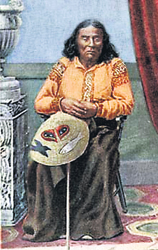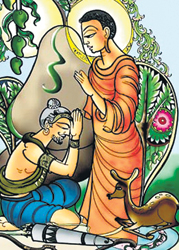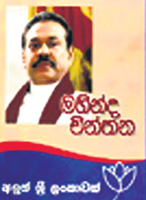
Sunday,
February 04, 2007
Vol.
41 - No 36
|
Mihindu Thera, Seattle and Mahinda Chintanaya ~ Searching for the common thread When President Mahinda Rajapaksa, then as Prime Minister unveiled his 'Mahinda Chintanaya' prior to the Presidential Election, his remark that he would be only the trustee and not the owner of this land created a furore with some of his ardent critics claiming that he had copied the statement from the famous speech by American Indian Chief Seattle.
But if one were to go back in history and refer to statements of this nature, invariably we could find another similarity in Venerable Mahinda Thera's remarks aimed at testing the intelligence of King Devanampiyatissa before the introduction of the Dhamma. The forerunner to the discourse is common knowledge and need not be gone into again. But the manner in which Arahat Mahinda set about winning over the people is worth repeating. E.F.C. Ludowyk has stated that it had "something of Socratic guile", while the erudite Buddhist scholar Ven. Walpola Rahula Thera has said it was the first 'intelligence test' on record. The questions and answers were as follows: First, to make sure that the king had enough intelligence to comprehend the Dhamma, Arahat Mahinda asked him what seemed very simple questions. The Sutta opens with the indirect warning not to rush into a conclusion on the first evidence - a large foot-print is not necessarily that of a great elephant - and proceeds to explain what the life of a monk is and how one becomes a Buddhist. Arahat Mahinda may have decided on this Sutta for his first sermon to introduce himself and his assistants, and dispel whatever suspicions King Devanampiyatissa had in the vicinity of Missaka.
And it is on record as Arahat Mahinda having said, "You are only a trustee and not the owner of this land." Let us switch our attention, centuries down the line, to the great Indian Chief Seattle. When the American government had wanted the Native Indians to move into reservations and was promised protection, the great Chief is said to have spoken to the message bearer, Governor Stevens, who had informed the natives that he had been appointed commissioner of Indian affairs for Washington Territory. Chief Seattle is said to have begun thus; "Yonder sky that has wept tears of compassion upon my people for centuries untold, and which to us appears changeless and eternal, may change. Today is fair. Tomorrow it may be overcast with clouds. My words are like the stars that never change. Whatever Seattle says, the great chief at Washington can rely upon with as much certainty as he can upon the return of the sun or the seasons. The white chief says that Big Chief at Washington sends us greetings of friendship and goodwill. This is kind of him for we know he has little need of our friendship in return. His people are many. They are like the grass that covers vast prairies. My people are few. They resemble the scattering trees of a storm-swept plain. The great, and I presume - good, White Chief sends us word that he wishes to buy our land but is willing to allow us enough to live comfortably. This indeed appears just, even generous, for the Red Man no longer has rights that he need respect, and the offer may be wise, also, as we are no longer in need of an extensive country….." and is supposed to have made mention of being only a trustee and not the owner of the land.
And after the passage of so many decades, a Presidential hopeful in Sri Lanka had repeated something similar. This bold and true statement need not be vilified or criticized. For, coming from one of our own sons of the soil, he had every right to have repeated a statement made by the bringer of Buddhism to this island, which in turn, has nurtured and propagated Buddhism in its truest form for so many centuries. It is a moot point wondering which came first, the egg or the chicken. Arahat Mahinda's conversation with King Devanampiyatissa is well recorded in the Great Chronicle, the Mahavamsa. Even though some challenge the authenticity of the chronicle itself, nobody has yet proved anything wrong in it as archaeological evidence backs it up. But Chief Seattle's speech has run into controversies by many questioning its authenticity. For instance, one of many an article in the internet states: "….. The authenticity of the text of "Chief Seattle's" speech as translated by Dr. Henry A. Smith is suspect, since it was published in a small journal in 1887, more than 30 years after Chief Seattle supposedly gave this speech in his native Salish language in 1854. Dr. Smith did not speak Salish, although he may have known Chinook, the Northwest Coast pidgin language. If Chief Seattle actually said these words (a big if), someone else at the 1954 speech may have translated it from Salish into Chinook and Smith then made notes about it, which he kept for more than 30 years before writing his "Chief Seattle" speech. More likely, Smith just made this speech up. The tiny newsletter that published his "Chief Seattle" was the first place that ever mentioned it; as Jerry Clark of the National Archives and Records Administration and other experts point out, we have no evidence, other than this article, that Chief Seattle ever gave this speech. Smith was an amateur poet and his "Chief Seattle" speech sounds suspiciously like his own poetry. Also, his speech emphasizes a theme that was popular among European Americans in his time-the inevitable disappearance of American Indians. (Was that wishful thinking by European Americans?) However, we do have fairly well-documented records of several other speeches that Chief Seattle gave….." Now comes the interesting part. Whether Chief Seattle made the speech or whether someone wrote an imaginary version of a speech, was it influenced by Arahat Mahinda's comment? Seems more likely, as Buddhism - originating far earlier than the Indian Chief - became a major interest in the West and the Westerners' interest would have prompted serious studies of and about Buddhism. Whoever or whatever was responsible for the comment of 'being only the trustee of the land', we Sri Lankans can be proud that the advent of Buddhism provided the basis for eloquence on nature and ecology in latter times. For, lest we forget, Buddhism lays firm commitments on the protection of nature and environment, as emulated by Mihindu Thera choosing to question King Devanampiyatissa on trees and its other kinds. And after centuries, if another would-be ruler, as a policy statement uttered the very same or similar words, was he not entitled to them? Indeed, he is. - TBS |
| |
Copyright
2007 Wijeya
Newspapers Ltd.Colombo. Sri Lanka. |


